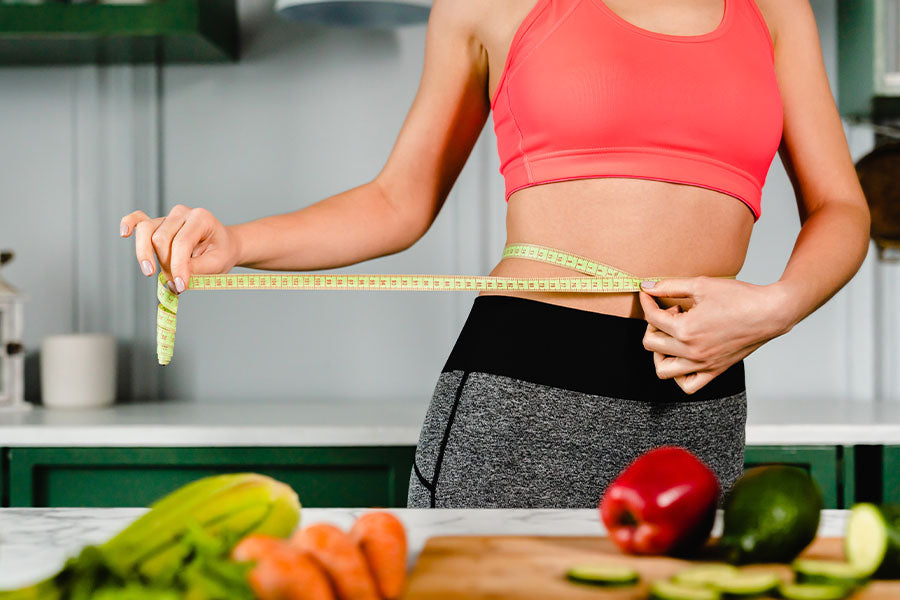If you're trying to lose weight, cutting out certain foods may seem like a logical step. However, many dietitians and nutrition experts argue that eliminating certain foods can hinder weight loss efforts. Several foods and supplements, such as a fat burner, can aid in weight loss. These foods are nutrient-dense and provide essential vitamins and minerals while also keeping you feeling full and satisfied.
In this article, we'll explore 7 foods that weight loss dietitians won't have you cutting out if you want to lose weight. These foods can play a key role in your weight loss journey, from whole grains to nuts and seeds.
7 Foods to Continue When on a Diet, According to Research
Let's explore 7 foods that research suggests should be included in your diet if you want to lose weight. These foods are nutrient-dense and provide essential vitamins and minerals while also keeping you feeling full and satisfied.
1. Nuts
Eating nuts as part of a weight loss journey is an excellent idea! Not only are they packed with good nutrients like healthy fats, fiber, and protein, but they also facilitate satiety - meaning they make you feel fuller longer. Eating nuts can reduce hunger cravings and prevent overeating.
Nuts are also incredibly versatile ingredients for cooking and snacking. From adding them to yogurt, salads, making nut butter or roasted nuts as snacks, there are endless possibilities to make creative meals and snacks from a single nut type – giving your diet some much-needed variety!
According to a study, individuals who ate more nuts and seeds had a lower BMI and waist circumference than those who ate less.
Lastly, it's important to remember that eating nuts in moderation as part of an overall balanced diet will contribute to long-term weight maintenance. So don't forget these little powerhouses on your journey to healthy living!
Related Article: 8 Types of Seeds & High Protein Nuts to Add to Your Diet
2. Whole Grains
Eating whole grains is a great choice when on a weight loss journey. Whole grains are complex carbohydrates that help provide one with long-lasting energy instead of the short burst of energy from refined carbohydrates, like white flour-based pasta. A study found that individuals who consumed more whole grains had a lower risk of weight gain.
Whole grains also contain essential vitamins, minerals, and fibers for a balanced diet. Whole grains aid digestion, can help lower cholesterol levels, regulate blood sugar levels, and reduce the risk of health issues such as heart disease and stroke.
3. Avocados
Avocados are a great source of potassium and healthy fats. Despite their higher caloric content, avocados are an incredibly nutritious fruit that makes them ideal for any balanced diet.
They have a high water content, which helps keep you satiated, meaning you don't feel as hungry. They also contain a wealth of vitamins, minerals, and healthy fats, particularly monounsaturated fatty acids (MUFAs), which help burn more calories following consumption.
A study suggests that individuals who consumed avocados had a lower BMI and waist circumference compared to those who did not consume avocados. The study indicated that avocado consumers had a lower BMI, smaller waist circumference, and were less likely to be overweight or obese.
Another study recommended that incorporating one avocado per day into a moderate-fat diet may improve cardiovascular disease risk factors, including body weight, abdominal obesity, and blood lipid levels.
The study included 45 overweight or obese adults and found that those who consumed an avocado per day for five weeks significantly decreased body weight and abdominal fat compared to the control group.
These studies suggest that including avocados in a weight loss diet may not only be beneficial but also it's an important part of a healthy diet, providing healthy fats, fiber, and other essential vitamins and minerals.
4. Greek Yogurt
Greek yogurt is a great weight-loss option due to its high protein and low-calorie content. Eating greek yogurt on a weight loss journey can help you achieve your goals. It is a naturally low-fat food packed with protein and probiotics that are great for your gut health.
Greek yogurt also has fewer calories than traditional yogurt, making it an ideal snack to eat throughout the day without worrying about adding extra calories to your diet.
A study published in the Journal of Nutrition and Metabolism in 2010 found that daily consumption of Greek yogurt as part of a calorie-controlled diet led to significant reductions in body weight, body fat, and waist circumference in overweight and obese adults.
The study also suggests that Greek yogurt consumption improved markers of metabolic health, such as blood glucose and insulin levels. Additionally, Greek yogurt's probiotic content can help to improve gut health, which may lead to better weight management.
Related Article: Greek Yogurt — 8 Reasons Why Greek Yogurt is the Best Food to Lose Weight Fast
5. Potatoes
Potatoes, a staple food in many diets, have often been stigmatized as fattening and unhealthy. However, research suggests that potatoes can be a part of a healthy diet and can even aid in weight loss. One study found that potatoes can be part of a weight loss diet without negative effects on body weight or blood lipid levels.
A study published in the Journal of the American College of Nutrition in 2017 found that when potatoes were included as a portion of a weight loss diet, they led to a greater feeling of fullness and reduced appetite, which may have helped participants stick to their diet and lose weight.
Potatoes are also a good source of vitamin C, potassium, and other essential vitamins and minerals that are important for overall health. Also, how potatoes are prepared, such as frying or adding high-calorie toppings, can increase the calorie content and make them less suitable for weight loss.
6. Fruits
Fruits have often been perceived as high in sugar and calories, which may lead some people to cut them off when trying to lose weight. However, research suggests that fruits can be a valuable part of a weight-loss diet.
Another research study found that a higher intake of fruits was associated with a lower risk of obesity and weight gain. The study included over 563277 participants and found that those who consumed more fruits had a lower BMI and a smaller waist circumference than those who consumed less.
Fruits are also a good source of vitamins, minerals, and antioxidants, which are important for overall health. They are also low in calories, which can help in weight loss. It's important to note that consuming fruits in moderation. Also, it's recommended to consume whole fruits instead of juice as they tend to have more fiber and less sugar.
7. Eggs
Eggs are often perceived as high in cholesterol. However, research suggests that eggs can be a valuable part of a weight loss diet.
According to research, consuming an egg-based breakfast result in a greater feeling of fullness and reduced calorie intake at lunch, compared to a bagel-based breakfast. The study concludes that consuming eggs as part of a weight-loss diet may benefit weight management.
Eggs are also a good source of vitamins, minerals, and essential nutrients, including high-quality protein, healthy fats, and vitamins such as vitamin D, which are important for maintaining a healthy weight.
They are also low in calories, which can help in weight loss. Also, it's recommended to consume egg whites or to limit the consumption of yolks to a moderate amount as they tend to have more cholesterol.
The Bottom Line
There are many factors to consider regarding weight loss, and healthy eating should be a major part of that equation. For most people, eliminating certain foods or food groups isn't necessary for successful weight loss. Weight loss dietitians suggest not cutting out calories entirely but rather harnessing portion control and practicing mindful eating.
Eating whole foods can be great in helping you lose weight as long as it is coupled with regular exercise and adequate hydration. The key is finding an approach that works best for you and your body—fitting in all nutritious options if possible. Though various sources might provide different advice, the consensus among health professionals is to strive for balance, moderation, and nutrition above all else when trying to reach your weight-loss goals.
Reading List
Article Sources
- Caetano Feitoza, Natalie. The Effect of Dairy Consumption with Exercise and Healthy Eating on the Metabolic Profile in Overweight/Obese Adolescent Girls. Mar. 2018. dr.library.brocku.ca, https://dr.library.brocku.ca/handle/10464/13313.
- Heskey, Celine, et al. “Avocado Intake, and Longitudinal Weight and Body Mass Index Changes in an Adult Cohort.” Nutrients, vol. 11, no. 3, Mar. 2019, p. 691. PubMed Central, https://doi.org/10.3390/nu11030691.
- Jackson, Chandra L., and Frank B. Hu. “Long-Term Associations of Nut Consumption with Body Weight And.” The American Journal of Clinical Nutrition, vol. 100, no. 1, July 2014, pp. 408S-411S. PubMed Central, https://doi.org/10.3945/ajcn.113.071332.
- Lichtenstein, Alice H., et al. “Effect of Incorporating 1 Avocado Per Day Versus Habitual Diet on Visceral Adiposity: A Randomized Trial.” Journal of the American Heart Association, vol. 11, no. 14, July 2022, p. e025657. DOI.org (Crossref), https://doi.org/10.1161/JAHA.122.025657.
- Maki, Kevin C., et al. “The Relationship between Whole Grain Intake and Body Weight: Results of Meta-Analyses of Observational Studies and Randomized Controlled Trials.” Nutrients, vol. 11, no. 6, May 2019, p. 1245. PubMed Central, https://doi.org/10.3390/nu11061245.
- Molin Netto, Bárbara Dal, et al. “Eating Patterns and Food Choice as Determinant of Weight Loss and Improvement of Metabolic Profile after RYGB.” Nutrition, vol. 33, Jan. 2017, pp. 125–31. ScienceDirect, https://doi.org/10.1016/j.nut.2016.05.007.
- Schwingshackl, Lukas, et al. “Fruit and Vegetable Consumption and Changes in Anthropometric Variables in Adult Populations: A Systematic Review and Meta-Analysis of Prospective Cohort Studies.” PLOS ONE, vol. 10, no. 10, Oct. 2015, p. e0140846. PLoS Journals, https://doi.org/10.1371/journal.pone.0140846.
- Zhu, Yaqiong. Comparing the Effect of Protein Quality on Satiety and Energy Intake between Egg and Cereal Breakfast, Following a Reduced Calorie Diet. Aug. 2019. ttu-ir.tdl.org, https://ttu-ir.tdl.org/handle/2346/85966.











